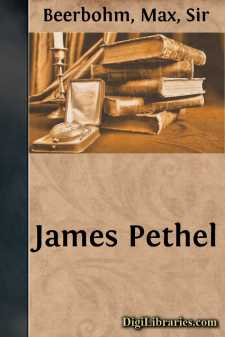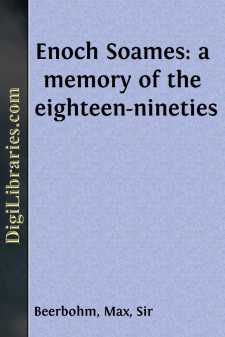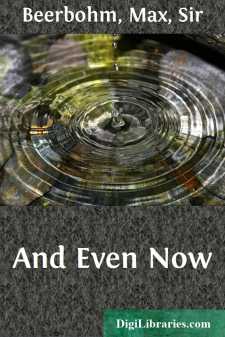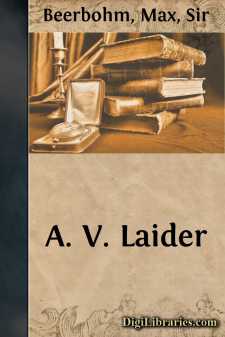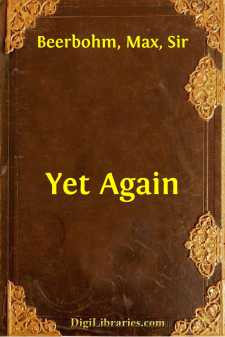Categories
- Antiques & Collectibles 13
- Architecture 36
- Art 48
- Bibles 22
- Biography & Autobiography 813
- Body, Mind & Spirit 142
- Business & Economics 28
- Children's Books 17
- Children's Fiction 14
- Computers 4
- Cooking 94
- Crafts & Hobbies 4
- Drama 346
- Education 46
- Family & Relationships 57
- Fiction 11829
- Games 19
- Gardening 17
- Health & Fitness 34
- History 1377
- House & Home 1
- Humor 147
- Juvenile Fiction 1873
- Juvenile Nonfiction 202
- Language Arts & Disciplines 88
- Law 16
- Literary Collections 686
- Literary Criticism 179
- Mathematics 13
- Medical 41
- Music 40
- Nature 179
- Non-Classifiable 1768
- Performing Arts 7
- Periodicals 1453
- Philosophy 64
- Photography 2
- Poetry 896
- Political Science 203
- Psychology 42
- Reference 154
- Religion 513
- Science 126
- Self-Help 84
- Social Science 81
- Sports & Recreation 34
- Study Aids 3
- Technology & Engineering 59
- Transportation 23
- Travel 463
- True Crime 29
James Pethel
by: Max Beerbohm
Description:
Excerpt
I was shocked this morning when I saw in my newspaper a paragraph announcing his sudden death. I do not say that the shock was very disagreeable. One reads a newspaper for the sake of news. Had I never met James Pethel, belike I should never have heard of him: and my knowledge of his death, coincident with my knowledge that he had existed, would have meant nothing at all to me. If you learn suddenly that one of your friends is dead, you are wholly distressed. If the death is that of a mere acquaintance whom you have recently seen, you are disconcerted, pricked is your sense of mortality; but you do find great solace in telling other people that you met "the poor fellow" only the other day, and that he was "so full of life and spirits," and that you remember he said—whatever you may remember of his sayings. If the death is that of a mere acquaintance whom you have not seen for years, you are touched so lightly as to find solace enough in even such faded reminiscence as is yours to offer. Seven years have passed since the day when last I saw James Pethel, and that day was the morrow of my first meeting with him.
I had formed the habit of spending August in Dieppe. The place was then less overrun by trippers than it is now. Some pleasant English people shared it with some pleasant French people. We used rather to resent the race-week—the third week of the month—as an intrusion on our privacy. We sneered as we read in the Paris edition of "The New York Herald" the names of the intruders, though by some of these we were secretly impressed. We disliked the nightly crush in the baccarat-room of the casino, and the croupiers' obvious excitement at the high play. I made a point of avoiding that room during that week, for the special reason that the sight of serious, habitual gamblers has always filled me with a depression bordering on disgust. Most of the men, by some subtle stress of their ruling passion, have grown so monstrously fat, and most of the women so harrowingly thin. The rest of the women seem to be marked out for apoplexy, and the rest of the men to be wasting away. One feels that anything thrown at them would be either embedded or shattered, and looks vainly among them for one person furnished with a normal amount of flesh. Monsters they are, all of them, to the eye, though I believe that many of them have excellent moral qualities in private life; but just as in an American town one goes sooner or later—goes against one's finer judgment, but somehow goes—into the dime-museum, so year by year, in Dieppe's race-week, there would be always one evening when I drifted into the baccarat-room. It was on such an evening that I first saw the man whose memory I here celebrate. My gaze was held by him for the very reason that he would have passed unnoticed elsewhere. He was conspicuous not in virtue of the mere fact that he was taking the bank at the principal table, but because there was nothing at all odd about him.
He alone, among his fellow-players, looked as if he were not to die before the year was out. Of him alone I said to myself that he was destined to die normally at a ripe old age. Next day, certainly, I would not have made this prediction, would not have "given" him the seven years that were still in store for him, nor the comparatively normal death that has been his. But now, as I stood opposite to him, behind the croupier, I was refreshed by my sense of his wholesome durability. Everything about him, except the amount of money he had been winning, seemed moderate. Just as he was neither fat nor thin, so had his face neither that extreme pallor nor that extreme redness which belongs to the faces of seasoned gamblers: it was just a clear pink. And his eyes had neither the unnatural brightness nor the unnatural dullness of the eyes about him: they were ordinarily clear eyes, of an ordinary gray. His very age was moderate: a putative thirty-six, not more. ("Not less," I would have said in those days.) He assumed no air of nonchalance. He did not deal out the cards as though they bored him, but he had no look of grim concentration. I noticed that the removal of his cigar from his mouth made never the least difference to his face, for he kept his lips pursed out as steadily as ever when he was not smoking....


